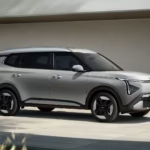The growth of the EV market in the United States has been progressive in the recent past due to the implementation of policies on clean energy mobility. Among these, the federal EV tax credit has been one of the significant parts with extended importance for consumer engagement in electric cars.
However, as the U.S. prepares for the upcoming 2024 presidential election, what has been offered as tax credit incentives remains unpredictable. EV companies and battery makers are now calling on President-elect Donald Trump and his transition team not to eliminate the existing EV tax credits as they are threatened by tax plan review.
This article provides more insights about why these tax credits are vital, or even critical to the future growth of the EV market, the consequences likely to be triggered in the instance the tax credits are repealed, and more so, the controversy surrounding this topic.
The Battle Over EV Tax Credits
The $7,500 federal consumer tax credit for the purchase of electric vehicles has been part of the United States’ push to build a more environmentally friendly automotive industry.
This is in the Inflation Reduction Act IRA that has been set up by President Joe Biden to encourage consumers and therefore the automotive manufacturers to ramp up the uptake of electric vehicles.
However, new information has emerged showing that Trump’s transition team is planning to scrap this credit as part of a larger reform of the American tax system.
As insiders have hinted regarding Trump’s transition team, new energy-policy leaders such as Harold Hamm and Doug Burgum are scheming to do away with the EV tax credit.

The proposed change could result in the following consequences in the U.S. EV market which has been rising over the past years but still struggling to challenge international players, particularly China.
EV companies, particularly upstarts whose ability to achieve scale has been limited by the dominance of legacy auto manufacturers, are cautioning that the elimination of these credits could slow down the shift towards electric vehicles, along with a lessening of the competitiveness of the American auto industry on a global level.
Why EV Companies Are Concerned
The key issue with phasing out the tax credit is that there is potential to cause mass electrified consumers thereby undermining the EV market in the market segments that were informed by affordability.
While the growth has been consistent in the U.S., electrified vehicles remain costlier than their ICE counterparts implying that battery costs and technological improvements in EVs are not fully realized.
The change could be less for carmakers that have risen to the top of the US market for EVs, such as Tesla. Tesla has developed a powerful brand and manufacturing base which lets it compete with other car makers on both the cost and technological propositions, disregarding subsidies.
Tesla’s own Elon Musk has suggested that the removal of the subsidy may even be for the best since Tesla may be at a disadvantage to other EV manufacturers who are still in the process of establishing production.
However, with larger or older manufacturers dominating the market and established players, the exercise of the provision could be catastrophic to many of the emerging new EV manufacturers such as Rivian, Lucid, and others.
These companies depend so much on subsidies to make their vehicles more affordable to buyers in the market. Without these incentives, these EV startups would have big problems regarding their sales and their ability to make money.
The Impact on Traditional Automakers
All automotive companies in this study such as General Motors (GM), Ford, and Stellantis have been gradually increasing their EV production in recent years but have faced several challenges while transitioning from internal combustion engine vehicles to electric ones.
The production cost of EVs is generally higher than conventional cars and may take some years to bring down from today’s level. Federal tax credits have remained a lifeline to these automakers as they have assisted them in the quest to lower the price tag of EVs and hence make them more affordable in the market.
For example, Ford is currently experiencing problems with one of its models – F-150 Lightning which is an EV based on the traditional F-150 full-size pickup model.
Still, an increasing trend in the adoption of EVs has not been reflected in the sales of the vehicles of this category, let alone some car manufacturers, such as Ford, that have stopped production of this vehicle for the rest of the year due to low demand.
Ford, like most car makers, uses EV tax credit 2024 to encourage take up and make electric vehicles attainable for a wider populace of consumers.
On the other hand, GM has claimed its intent to increase the production of EVs, nonetheless, it has averred that any elimination of tax credits would put more pressure on it to make money on EVs.
In a statement, GM claimed it was forecast to lose around $2B-$4B every year on electric vehicle initiatives and would not be able to have an adequate ROI without these crucial subsidies.
The Battery Makers’ Perspective
Automobile battery producers, specifically those that supply batteries to key car manufacturers – including LG Energy Solution and Samsung SDI, support the extendment of the EV tax credit.
The tax credit is applicable across the EV value chain right from production to the battery systems that drive electric vehicles. For battery manufacturers, phasing out the tax credit may result in slower sales of EVs which automatically lowers their battery demand.
The MEC market is expected to expand rapidly at least ten years in the future, but this growth rate is likely to be lowered if consumers do not need to encourage the purchase of electric vehicles.
Global Competitiveness: A Threat from China
Mentioned by current EV companies and industry supporters as perhaps the most persuasive, the next argument states that the US risks ceding the competitive baton to China. China is today the world’s biggest EV market, with homegrown players such as BYD and NIO gaining a foothold within the market.
Many of these firms have access to large state subsidies and more relaxed policies enabling them to increase output and thereby reduce costs.
Accordingly, firms manufacturing electric vehicles posit that, in a globe that is rapidly embracing emissions, America cannot afford to fall behind. Eliminating the tax credits through the actions of Trump’s transition team means ceding the market, and indeed the playing field, to China which is ruling the roost in terms of electric vehicles.
Earlier this month, US Energy Secretary Jennifer Granholm actively advocated against the possible elimination of the tax credits claiming that such a decision would make the US less competitive internationally.
To President Granholm’s chagrin, McInerney pointed out that ending the credits would help China, deepen the U.S. trade imbalance, and retard the development of a cleaner greener economy.
EV Companies Call for Action
Given these concerns, EV companies are now urging founders of Congress, as well as the Trump administration to extend the tax credit essential for the advancement of the nation’s transition to electrical mobility.
The car manufacturers’ lobby in the country has been most vocal in the need to preserve the EV incentives, with the Alliance for Automotive Innovation referring to it as important for entrenching the nation as a hub of manufacturing tomorrow’s cars today.
Tesla of course has been the main beneficiary of the EV tax credits and yet it has advocated for the continuation of the subsidies since it appreciates that the continued growth of the EV market is fundamental to sustainable profitability.
Although the firm could potentially remain solvent even if all the subsidies were cut out, Musk and other business leaders understand that healthy competition from their competitors is good for the entire market.
The Political Landscape
While the debate over the EV tax credits, it is still unclear as to what course the Trump administration and Congress will follow. Since Republicans are now the masters of the legislative clocks, the transition team’s desire to repeal the tax credit may start to be realized.
Though political considerations add layers to the mix, support for clean energy continues to enjoy bipartisan support among the population.
Also, one of the most influential labor unions in the United States – The UAW (United Auto Workers) which has many auto workers in its member base has shown great support for Biden regarding E.V policies inclusive of the tax incentives.
Union has also made complaints that the tax credits for EVs protect employment in the auto industry through the manufacturing of electric cars.
Conclusion
The contentious debate that currently surrounds the EV tax credit is a vital presidential concern with future implications for the American auto market. Tesla and other EV companies, next-generation battery manufacturers, and environmental groups plea to the Trump administration not to eliminate the key incentives at risk.
On one hand, automakers will struggle to shift to environmentally friendly production, while consumers will find it difficult to command environmentally sustainable vehicles. For more information regarding Electric Vehicle Tax Credits visit here.
As these two sides fought, one thing was evident – the future of automotive manufacturing in the United States and the country’s energy agenda were on the precipice.
Still, says the report, EV manufacturers have to keep on pressing their case, and at the same time, seek better ways by which these might be offered cheaply in the market. For more information related to the future of electric vehicles in India do visit here.
Disclaimer
The views expressed in this article are strictly the views of the author intended for informational purposes only. Indeed, the state of affairs connected with EV tax credits and the U.S. energy policy may vary depending on political processes and new legislation. It is advisable to consult official bodies for current statistical information.
FAQs
1. What is the EV tax credit?
The EV tax credit is a federal incentive program that enables the consumer to deduct up to $7,500 on their tax liabilities for purchasing an electric vehicle. This credit ensures that the prices of EVs come down and that many people are able to afford to use them.
2. Why does each EV firm seek to retain the tax credit?
The proponents of EVs similarly claim that the tax credit enables those interested in EVs to afford the cars and thus makes sure that the US is in the race for EV production.
3. What can be said about the prospect of eliminating the EV tax credit?
Removing the tax credit would probably halt EV demand and make it more difficult for EV companies to ramp up output and reach reasonable gross margins.
4. To whom does the EV tax credit most advantage?
As of now, all the EV autos have benefited but historically Tesla has its advantage taking most of the tax credit. However, many other small EV startup companies as well as traditional automotive manufacturers such as General Motors and Ford depend on these incentives to sell their cars.




